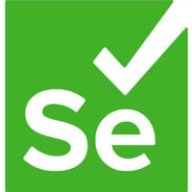

Parasoft SOAtest and Selenium HQ are contenders in the software testing domain, each excelling in API and web application testing respectively. Selenium HQ seems to have the upper hand due to its wide browser compatibility and cost-effectiveness.
Features: Parasoft SOAtest provides comprehensive API testing with easy setup for functional test scenarios and robust validation features, alongside high extensibility with custom scripting support. Selenium HQ stands out in web application testing, offering excellent browser compatibility, integration with multiple programming languages, and flexibility in creating custom automation frameworks due to its open-source nature.
Room for Improvement: SOAtest requires enhancements in user-friendliness, reporting, and tool integration, as its reporting features can be overly technical. Selenium HQ needs a more user-friendly interface and improved mobile testing capabilities, with challenges noted in handling dynamic content and lacking desktop application support.
Ease of Deployment and Customer Service: Parasoft SOAtest is typically deployed on-premises and is backed by highly praised customer support, despite occasional delays in complex scenarios. Selenium HQ, while flexible in deployment across on-premises and cloud environments, lacks dedicated technical support and relies on community resources, which can be challenging for complex issue resolutions.
Pricing and ROI: SOAtest has higher upfront costs with a complex licensing structure, but users find its extensive capabilities justify the investment. Selenium HQ, being free and open-source, appeals to businesses looking for cost-effective solutions, although the costs of framework setup and maintenance should be considered. SOAtest delivers high ROI when used extensively, whereas Selenium offers a budget-friendly alternative.
We found Parasoft SOAtest to be quick in building up test patterns, allowing us to create complex tests efficiently.
Tasks that previously took four or five minutes can now be completed in 20 to 30 seconds with the help of the tool.
The marketplace community and forums are what we browse and look after, and we have found solutions whenever we tried to find anything.
I have not had the need to escalate questions to Selenium HQ tech support recently, as open community support is widely available and has been sufficient for our needs.
We can execute thousands of test cases weekly, and our automation coverage using Selenium HQ is approximately eighty-five percent.
In particular use cases with numerous steps, it experiences crashes.
Selenium HQ is a scalable solution; it has been in production for the last two years, but I have been working on it for the last six years, so it is definitely scalable.
One improvement would be to integrate it with modern technologies such as AI, so we can generate test cases by providing the details so that it can generate the structure, and later the person working can modify and enhance it.
It did not support enough of the protocols or cryptography formats we needed, which led us to create our own solutions.
In terms of improvements for Parasoft SOAtest, some features could be added or perhaps existing areas could be improved, such as lowering prices.
An automatic update mechanism for Selenium HQ would be beneficial, eliminating the need for manual downloads and updates of browser drivers when new versions are released.
I don't know if we have that capability to provide different data sources such as SQL Server, CSV, or maybe some other databases, so that kind of capability would be great.
Parasoft SOAtest is expensive, but it was acquired because the company was dissatisfied with Quick Test Pro.
The best feature of Parasoft SOAtest is the extension tool where we can write our custom scripts.
Parasoft SOAtest improves the quality of the application, increases security and security compliance, and it is a cost-effective tool.
Parasoft SOAtest is very good at ensuring tests don't pass or fail until they genuinely pass or fail.
New features in Selenium HQ make object identification easier without reliance on XPath and CSS.
When we were doing these tests manually, it took several hours of effort, and those hours, when counted on the basis of person days, used to be maybe six or seven months of effort, which we can now do every day by running the pipeline.
| Product | Market Share (%) |
|---|---|
| Selenium HQ | 3.3% |
| Parasoft SOAtest | 1.9% |
| Other | 94.8% |

| Company Size | Count |
|---|---|
| Small Business | 9 |
| Midsize Enterprise | 3 |
| Large Enterprise | 23 |
| Company Size | Count |
|---|---|
| Small Business | 41 |
| Midsize Enterprise | 33 |
| Large Enterprise | 51 |
Parasoft SOAtest delivers fully integrated API and web service testing capabilities that automate end-to-end functional API testing. Streamline automated testing with advanced codeless test creation for applications with multiple interfaces (REST & SOAP APIs, microservices, databases, and more).
SOAtest reduces the risk of security breaches and performance outages by transforming functional testing artifacts into security and load equivalents. Such reuse, along with continuous monitoring of APIs for change, allows faster and more efficient testing.
Selenium HQ is an umbrella project that includes a number of tools and frameworks that allow for web browser automation. In particular, Selenium offers a framework for the W3C WebDriver specification, a platform- and language-neutral coding interface that works with all of the main web browsers.
Selenium is a toolset for automating web browsers that uses the best methods available to remotely control browser instances and simulate a user's interaction with the browser. It enables users to mimic typical end-user actions, such as typing text into forms, choosing options from drop-down menus, checking boxes, and clicking links in documents. Additionally, it offers a wide range of other controls, including mouse movement, arbitrary JavaScript execution, and much more.
Although Selenium HQ is generally used for front-end website testing, it is also a browser user agent library. The interfaces are universal in their use, which enables composition with other libraries to serve your purpose.
The source code for Selenium is accessible under the Apache 2.0 license. The project is made possible by volunteers who have kindly committed hundreds of hours to the development and maintenance of the code.
Selenium HQ Tools
These three main Selenium HQ tools have powerful capabilities:
Reviews from Real Users
Selenium HQ stands out among its competitors for a number of reasons. Two major ones are its driver interface and its speed. PeerSpot users take note of the advantages of these features in their reviews:
Avijit B., an automation tester at a tech services company, writes of the solution, “The driver interface is really useful. When we implement the Selenium driver interface, we can easily navigate through all of the pages and sections of an app, including performing things like clicking, putting through SendKeys, scrolling down, tagging, and all the other actions we need to test for in an application.”
Another PeerSpot reviewer, a software engineer at a financial services firm, notes, “Selenium is the fastest tool compared to other competitors. It can run on any language, like Java, Python, C++, and .NET. So we can test any application on Selenium, whether it's mobile or desktop."
We monitor all Functional Testing Tools reviews to prevent fraudulent reviews and keep review quality high. We do not post reviews by company employees or direct competitors. We validate each review for authenticity via cross-reference with LinkedIn, and personal follow-up with the reviewer when necessary.